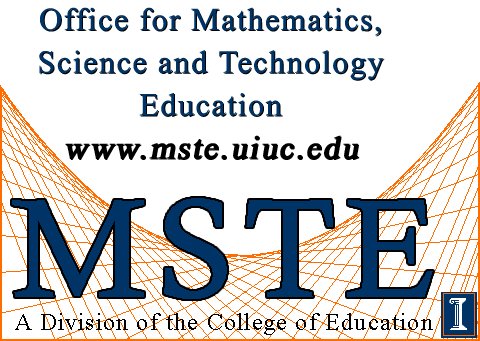NCTM STANDARD 10:
STATISTICS
10-1:
Construct and draw inferences from charts, tables, and graphs that
summarize data from real-world situations
10-3: Understand
and apply measures of central tendency, variability, and correlation
10-4:
Understand sampling and recognize its role in statistical claims
- Connections to the National Science
Education Standards
CONTENT
STANDARDS: 9-12
(a) In Content Standard A: Use technology and mathematics to
improve investigations and communications.
(b) In Content Standard E: Develop abilities and
understandings about science and technology.
- Connections to the Illinois Learning
Standards
FOR MATHEMATICS:
(a) 10.A.5: Construct a statistics-based presentation
individually and as members of a team to communicate and justify the
results of a project.
(b) 10.B.4: Design and execute surveys or experiments, gather
data to answer relevant questions, and communicate results and
conclusions to an audience using traditional methods and contemporary
technology.
FOR SCIENCE:
(a) 11.A.5d: Apply statistical methods to make predictions and
test the accuracy of results.
(b) 11.B.5a: Identify and design problem that has practical
applications and propose possible solutions, considering such
constraints as available tools, materials, time and costs.
FOR ENGLISH LANGUAGE ARTS:
(a) 1.C.5f Use tables, graphs and maps to challenge arguments,
defend conclusions and persuade others
(b) 3.B.5 Using contemporary technology, produce documents of
publication quality for specific purposes and audiences; exhibit
clarity of focus, logic of organization, appropriate elaboration and
support and overall coherence.
(c) 3.C.5a Communicate information and ideas in narrative,
informative and persuasive writing with clarity and effectiveness in a
variety of written forms using appropriate traditional and/or
electronic formats; adapt content, vocabulary, voice and tone to the
audience, purpose and situation.
FOR SOCIAL STUDIES:
(a) 15.B.2: Identify factors that affect how consumers make
their choices
(a) 15.B.4a: Explain the costs and benefits of making consumer
purchases through differing means (e.g., credit, cash).
(b) 15.D.5a: Analyze the impact of changes in non-price
determinants (e.g., changes in consumer income, changes in tastes and
preferences) on consumer demand.



